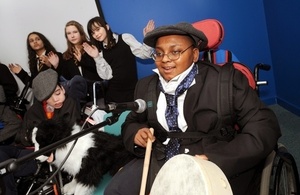Views sought on inspecting special educational needs provision
Ofsted and the Care Quality Commission want these inspections to act as a catalyst for improvement.

Disabled student in a music lesson
Inspectors from Ofsted and the Care Quality Commission (CQC) will assess how effectively local areas are fulfilling their obligations towards children and young people with special educational needs, under new proposals announced today (Monday 12 October).
A new form of inspection will begin in May 2016. For the first time inspectors will evaluate how local authorities, nurseries, schools, further education establishments, and health services identify children and young people with special educational needs. They will also evaluate how well they provide services to meet these needs, both in nursery, school or further education college, and through specialist services, such as speech and language therapy, physiotherapy and mental health services.
Crucially, inspectors will look at a sample of students’ files and information about their progress. Inspectors will visit early years settings, schools and further education colleges to see how they are helping to meet the local area’s responsibilities.
Ofsted and the CQC want these inspections to act as a catalyst for improvement, so that some of the most vulnerable young people in the country benefit consistently from high-quality services to which they are entitled.
The inspection reports will also highlight particular strengths and good practice in local areas, to encourage other areas to model similar practices. These evaluations will also include children’s and young people’s progress towards their next stage of education or employment.
The overall aim is to see all children and young people with special educational needs do well in education, be more independent, find employment and be an increasing part of their local communities.
Ofsted and the CQC are seeking the widest possible range of views from all those with an interest in disability and special educational needs. The consultation asks for responses to the following proposals:
- inspectors will evaluate how effectively the local area identifies disabled children and young people and those who have special educational needs
- inspectors will evaluate how effectively the local area meets the needs and improves the outcomes of disabled children and young people and those with special educational needs
- a wide range of information will be used to evaluate the effectiveness of local area arrangements. This will include the views of children and young people, parents and carers, recent inspection reports and visits to a number of local education and health service providers
- a wide range of approaches will be used during the inspection to obtain the views of disabled children and young people, and their parents and carers, including meetings, online questionnaires and social media
Sean Harford, Ofsted’s National Director for Education, said:
Inspection is a catalyst for improvement. We have seen that in schools and in other providers, where quality has risen over time. This has benefited hundreds of thousands of young people, giving them the prospect of a brighter future.
We now turn our attention to the ways in which local areas deliver services for children and young people with special educational needs. We will look carefully at how the local area identifies the needs of young people and scrutinise how well it meets these needs. This includes nurseries, schools and colleges as well as the contribution of specialist services, such as speech therapy and other specialist educational and health services.
We will want to see evidence that the children and young people are progressing well, to their next stage of education or employment. Effective local area support is crucial for these children and young people who really need them.
Ofsted will highlight good practice, so that we can celebrate success. I hope that other areas will be inspired by this good practice, which will lead to improvements elsewhere. I also hope the result will be better support for some of the most vulnerable young people in society, helping to give them the best possible start in life.
Care Quality Commission Chief Inspector of General Practice, Professor Steve Field said:
Young people and children with special educational needs or disabilities can face a complex system comprising many different health and educational agencies. It can be a bewildering experience for families having to coordinate different types of support.
That’s why it’s important that we examine how well these different partners work together to meet the care needs of this often vulnerable group.
It is absolutely right that in the twenty-first century, all children and young people receive the support they need and deserve. We need your views on how to best inspect in this area and urge you to help us define this critical programme.
This consultation will close on 4 January 2016.
Notes to editors
- The consultation ‘The inspection of local areas’ effectiveness in identifying and meeting the needs of children and young people who are disabled and/or have special educational needs’ is online.
- The Office for Standards in Education, Children’s Services and Skills (Ofsted) regulates and inspects to achieve excellence in the care of children and young people, and in education and skills for learners of all ages. It regulates and inspects childcare and children’s social care, and inspects the Children and Family Court Advisory and Support Service (Cafcass), schools, colleges, initial teacher training, work-based learning and skills training, adult and community learning, and education and training in prisons and other secure establishments. It assesses council children’s services, and inspects services for looked after children, safeguarding and child protection.
Media enquiries
Clive House
70 Petty France
London
SW1H 9EX
Email pressenquiries@ofsted.gov.uk
Monday to Friday, 8:30am to 6pm 0300 013 0415
Out of hours duty press officer 07919 057 359